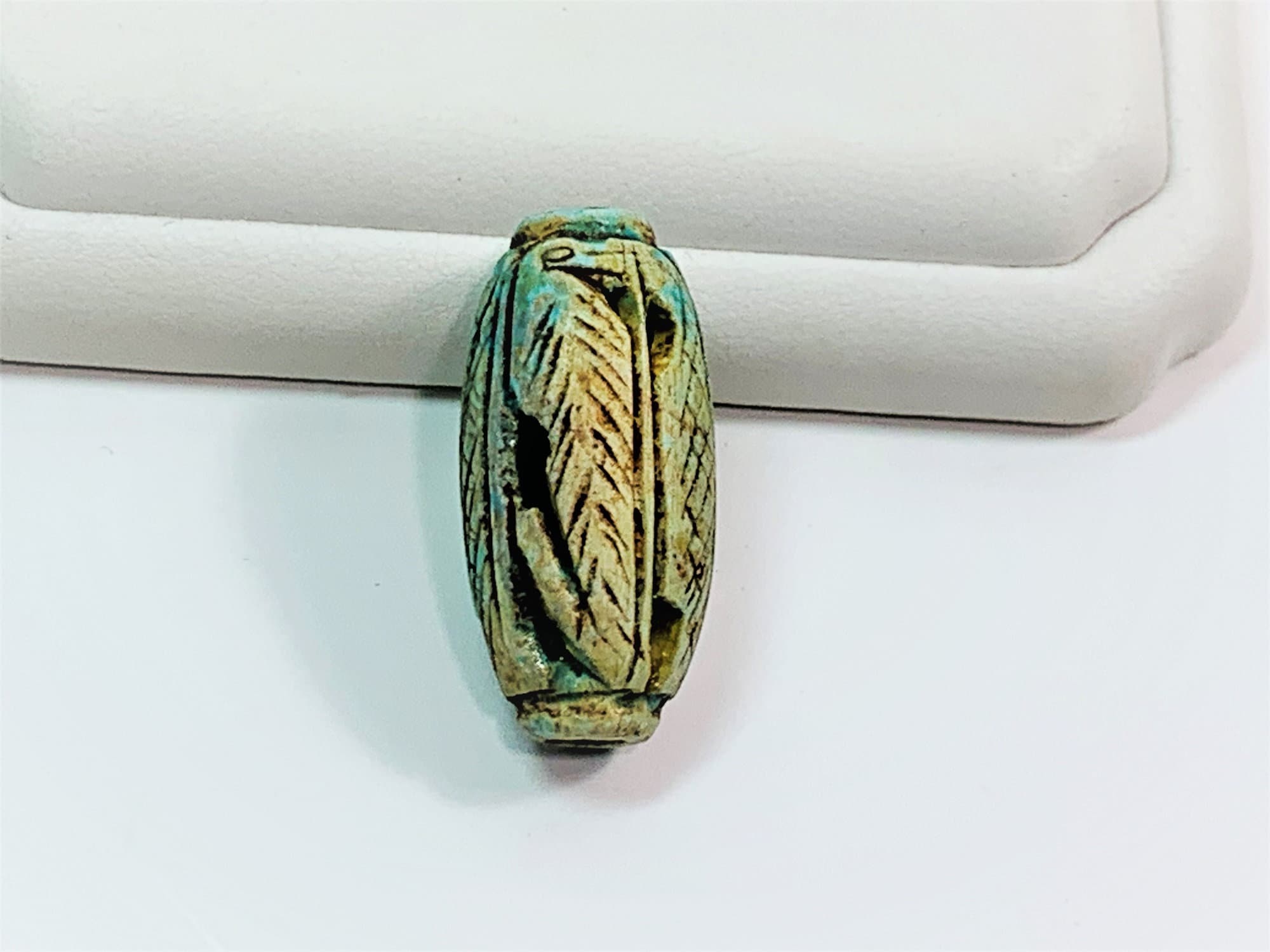Vintage Ancient Egyptian Faience Bead-Amulet, A Rare Amulet, Egyptian Cobra, Maat & Thoth. Valley Of The Queens, Luxor - Egypt. 31 mm Long.
$52.00
VINTAGE ANCIENT EGYPTIAN FAIENCE BEAD - AMULET. VERY RARE AMULETS
- KNOWN AS "QUEENS BEAD", ROUNDED EDGES, CARVED ON ALL SIDES
- EGYPTIAN COBRA - SYMBOL OF GREAT POWER
- GOD THOT (BABOON), GOD OF WISDOM - KNOWLEDGE.
- FEATHER, SYMBOL OF GODDESS MAAT OF JUSTICE.
THE BABOON WAS THE MOST WELL-KNOWN MANIFESTATION OF THE MOON GOD THOTH.
- THOTH TOOK ON THE POSITION AS 'GOD OF THE SCRIBES', ASSOCIATED WITH THE SUBJECTS OF WRITING, SCIENCE, JUDGEMENT, KNOWLEDGE AND THE AFTERLIFE.
A FASCINATING EXAMPLE OF ANCIENT FINE ART
*ACTUAL PHOTOS OF THE AMULET - AS IT WAS ACQUIRED
Egyptian faience is a glassy substance manufactured most expertly by the ancient Egyptians, Faience was made by grinding quartz or sand crystals together with various amounts of sodium, potassium, calcium, magnesium, and copper oxide. The resulting substance was formed into whatever shape was desired, whether an amulet, beads, a broach or a figurine and then said pieces were heated. During heating, the pieces would harden and develop a bright color finely glazed. It is thought that the Egyptian artisans perfected faience in an attempt to imitate turquoise and other hard to find gem stones. The calcium silicates in the mixture were responsible for the bright colors and the glassy finish.
The Egyptians used faience for the manufacture of jewelry (rings, amulets, necklaces) but also in statuary, for scarabs, to create the board and pieces for the game of Sennet
The Egyptian word for Faience was Tjehenet which means 'Gleaming’ or 'Shining’ and the
Faience was thought to reflect the light of immortality. So closely was Faience associated
with the Egyptian afterlife that the Tiles for the Chamber Walls of Tombs were made of
Faience as was seen at King Djoser’s tomb at Saqqara and, most famously, in the tomb of
Tutankhamen where over one hundred objects were entirely or partially of faience.
The earliest evidence of a faience workshop has been unearthed at Abydos and dated to 5500 BCE. The workshop consists of a number of circular pits, clearly the remains of kilns, with a lining of brick and all of them fire-marked. Layers of ancient ash in the pits are evidence of continuous use over many years. Small clay balls were also discovered and it is thought that they may have been used as the surface on which faience beads were fired in the kilns. The names of the faience makers are lost to history save for one man, Rekhamun, who was known as “Faience Maker of Amun”, and another known as Debeni, the overseer of faience workers. Of the other craftsmen in faience, and there must have been many, nothing is known..
-ACQUIRED FROM VALLEY OF THE QUEENS, WEST THEBES, LUXOR, UPPER EGYPT, IN 1970
* EXACT AGE IS NOT DETERMINED
* AUTHENTIC EGYPTIAN. CERTIFICATE OF AUTHENTICITY INCLUDED
* IT IS GUARANTEED THAT THIS AMULET IS 53 YEARS OLD OR OLDER
- DIMENSIONS: 31mm LONG, 15mm, DIAMETER, 1 1/4 X 5/8 inch.. (APPROXIMATELY)
- COLOR: GREENISH BLUE AND REDDISH BEIGE
- HOLED, 4 mm HOLE
* FREE US SHIPPING
THANK YOU FOR YOUR INTEREST
Shipping from United States
Processing time
1-2 business days
Customs and import taxes
Buyers are responsible for any customs and import taxes that may apply. I'm not responsible for delays due to customs.
Payment Options
Returns & Exchanges
I gladly accept returns, exchanges, and cancellations
Just contact me within: 3 days of delivery
Ship items back to me within: 7 days of delivery
Conditions of return
Buyers are responsible for return shipping costs. If the item is not returned in its original condition, the buyer is responsible for any loss in value.
Questions about your order?
Please contact me if you have any problems with your order.
Privacy policy
We don’t store or share any information
Frequently Asked Questions
Custom and personalized orders
Yes we do custom orders, we create setting for any gem, we use precious metals only, Silver, white or yellow gold and platinum
Sizing details
most rings listed can be sized up or down, 3-5 days turn around, charges depend on the material of the ring and the size requested. Please contact us for details.
Care instructions
Available upon request
Gift wrapping and packaging
Available for any Occasion







